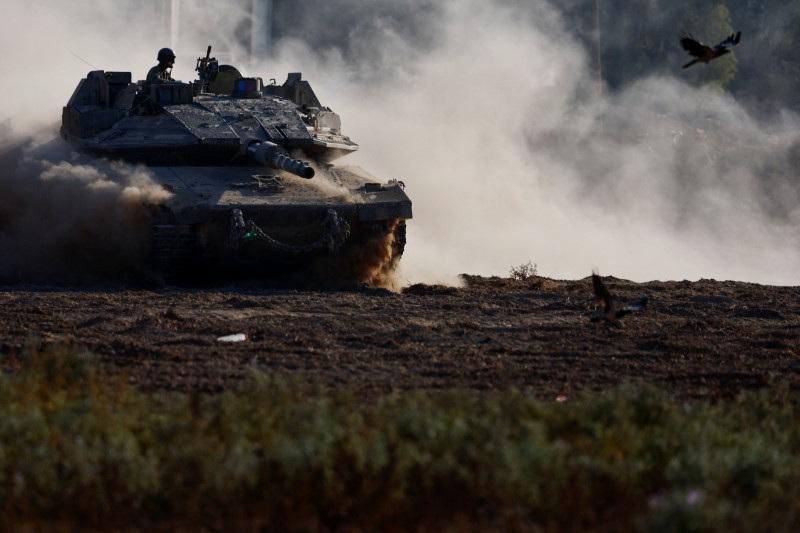By Andrew Mills and Nidal al-Mughrabi
DOHA/CAIRO (Reuters) -A new round of Gaza ceasefire talks was under way in the Qatari capital Doha on Thursday, officials said, with Israel's spy chief joining his U.S. and Egyptian counterparts and Qatar's prime minister for the closed-door meeting.
Separately, Gaza health officials reported that the death toll in the Palestinian enclave had surpassed 40,000 people after more than 10 months of fighting.
An official briefed on the talks said negotiations continued in Doha into the evening, and all participants were expected to continue meeting on Friday.
The negotiations, an effort to end bloodshed in Gaza and bring 115 Israeli and foreign hostages home, were put together as Iran appeared poised to retaliate against Israel after the assassination of Hamas leader Ismail Haniyeh in Tehran on July 31.
With U.S. warships, submarines and warplanes dispatched to the region to defend Israel and deter potential attackers, Washington hopes a ceasefire agreement in Gaza can defuse the risk of a full-out wider regional war.
Hamas officials, who have accused Israel of stalling, did not join Thursday's talks. Mediators planned to consult with Hamas' Doha-based negotiating team after the meeting, the official told Reuters.
Israel's delegation includes spy chief David Barnea, head of the domestic security service Ronen Bar and the military's hostages chief Nitzan Alon, defence officials said.
CIA Director Bill Burns and U.S. Middle East envoy Brett McGurk represented Washington at the talks, convened by Qatari Prime Minister Sheikh Mohammed bin Abdulrahman Al Thani, with Egypt's intelligence chief Abbas Kamel also in Doha.
Israel and Hamas have each blamed the other for failure to reach a deal yet neither side has ruled out an agreement.
On Wednesday, a source in the Israeli negotiating team said on Wednesday that Prime Minister Benjamin Netanyahu has allowed significant leeway on a few of the substantial disputes.
Gaps include the presence of Israeli troops in Gaza, the sequencing of a hostage release and restrictions on the free movement of civilians from southern to northern Gaza.
White House national security spokesperson John Kirby (NYSE:KEX) told reporters negotiators were focused on narrowing the gaps and implementing a framework agreement, which he said had been "generally accepted" by both sides.
"The remaining obstacles can be overcome, and we must bring this process to close," he said. "Today's a promising start."
In the lead-up to Thursday's talks, Hamas, which rejects any U.S. or Israeli intervention in shaping the "day after" the war in Gaza, told mediators that if Israel made a "serious" proposal in line with Hamas' previous proposals the group would continue to engage in negotiations.
Senior Hamas official Sami Abu Zuhri told Reuters on Thursday the group was committed to the negotiation process and urged mediators to secure Israel's commitment to a proposal Hamas agreed to in early July, which he said would end the war and required a full withdrawal of Israeli troops from Gaza.
'GRIM MILESTONE'
Even as negotiators worked in Qatar, fighting continued in Gaza, with Israeli troops hitting targets in the southern cities of Rafah and Khan Younis.
Palestinian health officials said at least six Palestinians were killed on Thursday night in an Israeli air strike on a house in Jabalia in northern Gaza Strip.
U.N. human rights chief Volker Turk said the Gaza death toll of more than 40,000 reported by the enclave's health ministry was a "grim milestone for the world".
"This unimaginable situation is overwhelmingly due to recurring failures by the Israeli Defense Forces to comply with the rules of war," he said in a statement from Geneva.
Separately, Israel's military said it had "eliminated" more than 17,000 Palestinian militants in its Gaza campaign.
In shattered Gaza where the war has driven almost all of its 2.3 million population from their homes, there was a desperate desire for an end to the fighting.
"Enough is enough, we want to get back to our homes in Gaza City, every hour a family is getting killed or a house getting bombed," said Aya, 30, sheltering with her family in Deir Al-Balah in the central part of the Gaza Strip.
"We are hopeful this time. Either it's this time or never I am afraid," she told Reuters via a chat app.
In Tel Aviv, families of some of the hostages protested outside the headquarters of Netanyahu's Likud party.

"To the negotiating team - if a deal is not signed today or in the coming days at this summit, do not return to Israel. You have no reason to return to Israel without a deal," said Yotam Cohen, whose brother Nimrod Cohen is a hostage in Gaza.
The hostages were taken in the Hamas raid on southern Israel on Oct. 7 in which Israel says the militants killed some 1,200 people, triggering the war in Gaza.